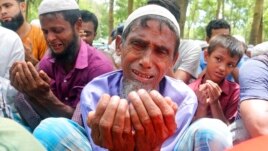05 October 2022
The social media site Facebook is under increasing pressure to provide reparations to Rohingya refugees in Bangladesh.
The rights group Amnesty International has accused Facebook and its owner Meta of serious wrongdoing against the refugees from Myanmar.
In a report released last week, Amnesty said Meta's programming "proactively amplified and promoted content" that incited violent hatred against the Rohingya. The report said the content began to appear on Facebook as early as 2012.

FILE - Rohingya refugees cry while praying during a gathering to mark the fifth anniversary of their exodus from Myanmar to Bangladesh, at a Kutupalong Rohingya refugee camp at Ukhiya in Cox's Bazar district, Bangladesh, Aug. 25, 2022. (AP Photo/ Shafiqur Rahman)
The investigators said the company failed to remove violent posts and lies, and helped to spread such posts. Amnesty said the final result of Meta's actions were the 2017 killings of Rohingya in Myanmar.
At the same time, Facebook's popularity was growing in Myanmar. For many people there, it served as their only connection to the online world. That made Facebook the main internet connection for a large part of Myanmar's population.
More than 700,000 Rohingya fled to neighboring Bangladesh in 2017. Myanmar security forces, the Tatmadaw, were accused of killings, rapes, and other torture, as well as the burning of Rohingya villages.
The Associated Press asked Meta about the Amnesty report. The company did not answer. In a statement, the company said it "stands in solidarity with the international community and supports efforts to hold the Tatmadaw accountable for its crimes against the Rohingya people."
Rafael Frankel is director of public policy for emerging markets at Meta Asia-Pacific. He said in a statement: "Our safety and integrity work in Myanmar remains guided by feedback from local civil society organizations and international institutions, including the U.N. Fact-Finding Mission on Myanmar; the Human Rights Impact Assessment we commissioned in 2018; as well as our ongoing human rights risk management."
'Dangerous to out human rights'
About one million Rohingya remain in camps. Most are in Bangladesh. They are demanding that Meta pay reparations for its part in the violent repression of Rohingya Muslims in Myanmar. Earlier this year, the United States declared that situation a genocide.
The Amnesty findings are based on reports from Rohingya refugees, former Meta employees, experts, activists and others. Investigators also used documents provided to the U.S. Congress last year by whistleblower Frances Haugen, a former Facebook data scientist.
The report noted that digital rights activists say Meta has improved its supervision in Myanmar in recent years. In January 2021, after a violent government overthrow, Meta barred the Myanmar military from its site.
But critics, including some Facebook employees, have argued that the current methods will never truly work.
Meta's programming is "really dangerous to our human rights," says Pat de Brún, lawyer and researcher on artificial intelligence and human rights at Amnesty.
What happened to the Rohingya and Facebook's part in the conflict, he continued, "risks happening again, in many different contexts across the world.
"The company has shown itself completely unwilling or incapable of resolving the root causes of its human rights impact," de Brún said.
After a 2018 U.N. report denounced Meta's actions in Myanmar, the company admitted that it was not doing enough to help prevent the incitement of violence. It changed some policies and the way it supervised the site over the next few years and claimed great success.
But the Amnesty report said the new measures were not enough.
The Rohingya refugees have not said what form the reparations should take. Meta is also the subject of two legal actions in the U.S. and Britain seeking $150 billion for Rohingya refugees.
Meta has refused to consider reparations.
"We believe that the genocide against Rohingya was possible only because of Facebook," said one refugee in the report. "They communicated with each other to spread hate, they organized campaigns through Facebook. But Facebook was silent."
I'm Caty Weaver.
The Associated Press's Barbara Ortutay reported this story. Caty Weaver adapted it for VOA Learning English.
______________________________________________________________________
Words in This Story
reparations – n. money given as a way of correcting a past mistake
amplify –v. to increase the strength of something
promote –v. to help something happen or increase
integrity –n. the quality of being honest and fair
institution –n. an established organization
commission –v. to order or request that something be done
whistleblower –n. a person show tells police, reporters or lawmakers about something that has been kept secret and that often involves wrongdoing
digital –adj. related to computers
artificial –adj. not natural, made by people
context –n. the situation in which something happens
impact –n. the influence or effect of something